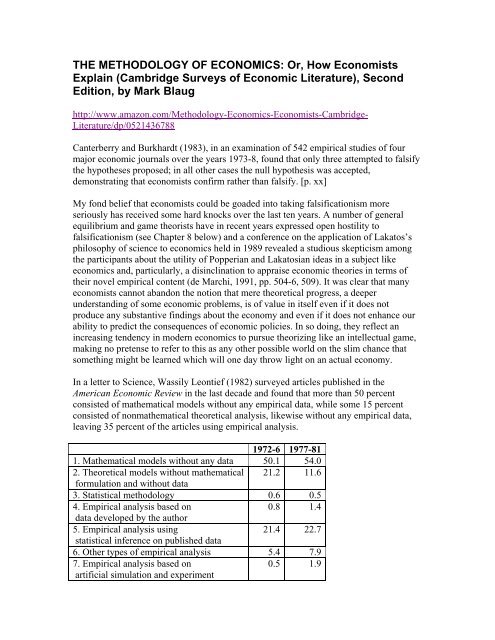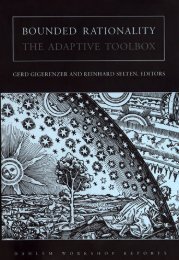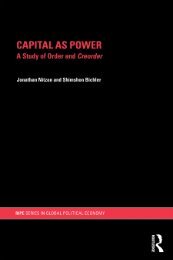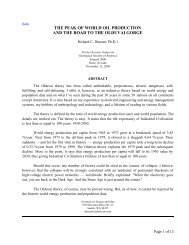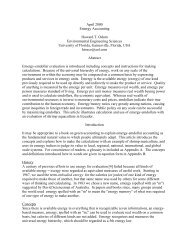THE METHODOLOGY OF ECONOMICS: Or, How ... - Dieoff.org
THE METHODOLOGY OF ECONOMICS: Or, How ... - Dieoff.org
THE METHODOLOGY OF ECONOMICS: Or, How ... - Dieoff.org
Create successful ePaper yourself
Turn your PDF publications into a flip-book with our unique Google optimized e-Paper software.
<strong>THE</strong> <strong>METHODOLOGY</strong> <strong>OF</strong> <strong>ECONOMICS</strong>: <strong>Or</strong>, <strong>How</strong> Economists<br />
Explain (Cambridge Surveys of Economic Literature), Second<br />
Edition, by Mark Blaug<br />
http://www.amazon.com/Methodology-Economics-Economists-Cambridge-<br />
Literature/dp/0521436788<br />
Canterberry and Burkhardt (1983), in an examination of 542 empirical studies of four<br />
major economic journals over the years 1973-8, found that only three attempted to falsify<br />
the hypotheses proposed; in all other cases the null hypothesis was accepted,<br />
demonstrating that economists confirm rather than falsify. [p. xx]<br />
My fond belief that economists could be goaded into taking falsificationism more<br />
seriously has received some hard knocks over the last ten years. A number of general<br />
equilibrium and game theorists have in recent years expressed open hostility to<br />
falsificationism (see Chapter 8 below) and a conference on the application of Lakatos’s<br />
philosophy of science to economics held in 1989 revealed a studious skepticism among<br />
the participants about the utility of Popperian and Lakatosian ideas in a subject like<br />
economics and, particularly, a disinclination to appraise economic theories in terms of<br />
their novel empirical content (de Marchi, 1991, pp. 504-6, 509). It was clear that many<br />
economists cannot abandon the notion that mere theoretical progress, a deeper<br />
understanding of some economic problems, is of value in itself even if it does not<br />
produce any substantive findings about the economy and even if it does not enhance our<br />
ability to predict the consequences of economic policies. In so doing, they reflect an<br />
increasing tendency in modern economics to pursue theorizing like an intellectual game,<br />
making no pretense to refer to this as any other possible world on the slim chance that<br />
something might be learned which will one day throw light on an actual economy.<br />
In a letter to Science, Wassily Leontief (1982) surveyed articles published in the<br />
American Economic Review in the last decade and found that more than 50 percent<br />
consisted of mathematical models without any empirical data, while some 15 percent<br />
consisted of nonmathematical theoretical analysis, likewise without any empirical data,<br />
leaving 35 percent of the articles using empirical analysis.<br />
1972-6 1977-81<br />
1. Mathematical models without any data 50.1 54.0<br />
2. Theoretical models without mathematical<br />
formulation and without data<br />
21.2 11.6<br />
3. Statistical methodology 0.6 0.5<br />
4. Empirical analysis based on<br />
data developed by the author<br />
0.8 1.4<br />
5. Empirical analysis using<br />
statistical inference on published data<br />
21.4 22.7<br />
6. Other types of empirical analysis 5.4 7.9<br />
7. Empirical analysis based on<br />
artificial simulation and experiment<br />
0.5 1.9
[p. xxi ]<br />
M<strong>org</strong>an (1988) has updated Leontief’s findings, showing once again that half the articles<br />
published in the American Economic Review and the Economic Journal do not use data<br />
of any kind, a ratio that vastly exceeds that found in articles in physics and chemistry<br />
journals. Oswald (1991a) has confirmed Leontief’s and M<strong>org</strong>an’s results in the area of<br />
microeconomics, concluding quite rightly that a large number of economists treat the<br />
subject as it if were “a kind of mathematical philosophy.” Perhaps a better expression<br />
would be “social mathematics,” that is, a brand of mathematics that appears to deal with<br />
social problems but does so only in a formal sense. What we have here is a species of<br />
formalism: the reveling in technique for technique’s sake. Colander and Klamer (1987;<br />
1988) have shown that students in American graduate schools perceive that analytical<br />
ability is the chief requirement for professional advancement and not knowledge of the<br />
economy or acquaintance with the economic literature. Students are usually shrewd<br />
observers of their own chosen profession and they have a sensitive nose for the “hidden<br />
agenda” in their curriculum. It is clear that American graduate students have correctly<br />
perceived that nothing succeeds in economics like mathematical pyrotechnics,<br />
supplemented on occasions by some fancy econometrics.<br />
The fact that graduate education in economics emphasizes technical puzzle-solving<br />
abilities at the expense of imparting substantial knowledge of the economic system is<br />
simply a reflection of the empty formalism that has come increasingly to characterize the<br />
whole of modern economics. And why not? What after all is wrong with elegant<br />
economics practiced as an intellectual pastime? There are, I suppose, two answers to this<br />
question. One is that some of us suffer from “idle curiosity” about the economy. Much as<br />
we enjoy abstract, mathematically formulated economics, we cannot help wondering just<br />
how the economy actually works, and most of the lemmas of rigorous pure theory do not<br />
really satisfy the desire to understand how things hang together in the economic world.<br />
The second answer is that economics throughout its long history has been intimately<br />
connected with economic policy, with the desire to improve economic affairs, eradicate<br />
poverty, equalize the distribution of income and wealth, combat depressions, and so on,<br />
and never more so than in the recent postwar period. But if economists are going to take a<br />
stand on questions of economic policy, not to mention advising governments what to do,<br />
they must have knowledge of how the economic system functions: we know that<br />
privatization if accompanied by an increase in the numbers of producers improves the<br />
quantity and quality of the goods privatized; we know that a deficit on the balance of<br />
payments can be cured by devaluation and even how quickly it can be cured; we know<br />
that inflation can be reduced by a hard fiscal and monetary policy and even what it will<br />
take to cut inflation by a given percentage – or do we? All this is to say that economics<br />
must be first and foremost an empirical science or else it must abandon its age-old<br />
concern with “piecemeal social engineering.”<br />
Granted that economists must ultimately judge their ideas by the test of empirical<br />
evidence – that analytical rigor may have to be traded off against practical relevance – it<br />
does not follow that they need to endorse the Methodology of falsificationism. The<br />
argument for an empirically minded economics might derive from methodological
considerations with a lowercase m. No doubt, but the fact remains that any<br />
metatheoretical recommendation is no better than the Methodology which underpins it.<br />
McCloskey notwithstanding, there is no logical or philosophical distinction between<br />
methodology and Methodology. And the Methodology which best supports the<br />
economist’s striving for substantive knowledge of economic relationships is the<br />
philosophy of science associated with the names of Karl Popper and Imre Lakatos. To<br />
fully attain the ideal of falsifiability is, I still believe, the prime desideratum in<br />
economics. [ p. xxii-xxiii ]


